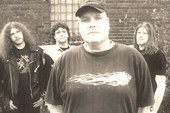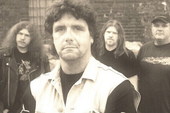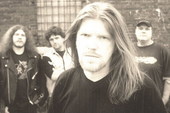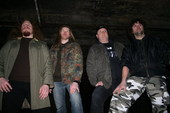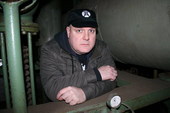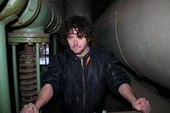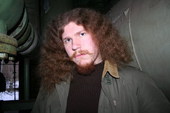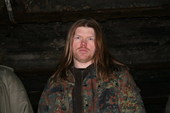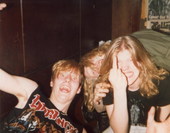Eure Erben
We Were Crazy, We Were Angry
21.12.2012
Архив интервью | Русская версияThe name Eure Erben may not be quite familiar to our readers, but the name Darkness should ring the bell for everybody who is into classic German thrash metal. Established in the mid-80s in Essen, Darkness were a very promising band and a strong rival to their townmen Sodom and Kreator. However, various problems prevented Darkness from entering the top league of metal and eventually caused its breakup. In the early 2000s the band members reunited, but decided not to use the former name and opened a new chapter in their history as Eure Erben. Having released two ЕРs (“Eure Erben” (2006) and “Eure Fauste” (2007)), the band finally unleashed their highly anticipated long player late last year. This made us contact singer/guitarist Arnd Klink who turned out very interested in discussing what is happening in the band at the moment and remembering once again the good ol’ days of thrash.
It seems you spent a lot of time recording your newest album “Terror 2.0”. Why did it take so long?
Eh, it’s a long story. First of all, we had no record company. The other point is that we recorded it in 2009, from September to December, and then our manager, his name is Martin, said it would be a great idea to record it in English too, so we had to take the music and I had to sing along with that music in English. Then the date of the release was postponed for three times because first there was a company, then there was no company, then we had distribution, then we had no distribution. So in December 2010 we said, “We have to release it. It doesn’t matter if there is a record company or not”, so we released it on a small record label run by the guy I know (the label is called Scare Records and its releases are distributed via www.musicatweb.com – ed.).
You’ve mentioned the English version of the newest CD. Once you said that Eure Erben is a German-singing band so what was the reason to add those English lyrics?
This is a kind of tribute to Darkness fans because many people always think of Darkness when they talk about us. Darkness is our history, it’s a big history on the background and so we said, “Ok, there are many people who like English lyrics, many people who like Darkness, so it will be our tribute to those people”.
What can you say about the reaction from the fans and press and about the sales of the new CD?
The reactions are very good. Most people like it but many people can’t get along with the German language, they have this problem. Many people are very conservative, they say that heavy metal and thrash metal have to be sung in English, not in German. They like the music but they can’t cope with German lyrics.
It’s a strange because there is a band called Onkel Tom. They sing in German and nobody has problems with it.
Tom Angelripper is recording schlager, it’s some kind of pop music sung in German. He recorded it in a heavy metal style and people like it because you can drink along and party along with those songs. Maybe that’s the reason why they don’t take it as serious as other bands because Onkel Tom is a kind of fun project. The amazing thing is that people outside Germany have no problems with the German language – they like it, they say it sounds very hard. Even if we say “hallo” and “good afternoon” in German, to the people who don’t speak German it sounds like command or something strange. They like it and they say it fits heavy metal or thrash metal. It’s pretty funny because German people have a problem with their own language and abroad there is no problem, people they like it more than in Germany.
Don’t you think about recording a kind of schlager with Eure Erben?
(laughs) No, because Onkel Tom did it and it would be just a copy and that’s not our thing. He does it as a fun project and it’s pretty funny. Lacky, our drummer, has got their CD, and it’s OK, but we don’t want to copy them.
Let’s return to your newest album. I saw the video for the song “Terror Fur Terror” and it shows you and other members of the band as victims of violence. What is the message behind this video?
In our lyrics we describe the bad things in the world – politics, corruption, war and terrorism. We are not a political band as many people say – we just describe, we just want to show that many, many things in the world are very bad. “Terror 2.0”, I think, is an image of the place where military men keep their weapons. I always say that the world is going down, it’s collapsing and we do songs for it.
Preparing for this interview I found some of your new tracks, such as “Adrenalin” or “Amok”, on YouTube. Is this sanctioned by the band?
No. Actually as a record is released there are people who put it on YouTube or you can download it via some forums on the Internet. People take it and put it on the Internet and they don’t care that the band has a problem with it. When the last album of Kreator was released it was on the Internet before it was in the stores. I know Mille, he lives two kilometers from here, and he was absolutely angry, he said, “It can’t be like that when an album is on the Internet before it hits the stores”.
It happens with every album nowadays.
Yes, but one point about the heavy metal scene is that you can be sure people who like the music of any band want to have the original album. Most people who I know don’t download albums. When they like a band they say: “I want to keep this CD inside my CD-player, I want to have it in my board”. They always want the original, that’s a very good point in the heavy metal scene. Most people use the Internet as some kind of appetizer. They say, “I like this and that song, so I have to buy the CD”. I think this is a good thing. It’s something like doing promotion on the Internet.
I really like the songs I heard through YouTube, they are very, very nice. Do you think you can make a breakthrough with this new album or did you record it just for your die-hard fans?
The problem is that the music we do is underground music. There is a certain number of people who like it, but you won’t get into the charts with that kind of music and that’s not we intent. Of course we would like to sell hundreds of thousands of CDs but I think that won’t happen because it’s underground music and the underground scene and the CD is distributed by us and by the small record company we’ve got. One good thing is that you can use the Internet for mailorder, and we’ve sold some boxes of the CDs to Japan, to the USA and even to Russia.
Earlier this year you were invited to play a show as an opening band for Sodom. How did you get this gig and did they treat you well?
Yes, of course. We know the guys from Sodom, and we’ve played together with them three times this year at festivals, and when they were on tour in February we supported them at one show in Eindhoven, the Netherlands. They are companions of ours, we know them and we are always treated very well by them. They are nice guys and before and after the show we always have a beer together backstage – that was very good. Tom is a very, very nice guy, a very polite guy, he doesn’t behave like a star backstage. He is just a guy like you and me, he is also a heavy metal fan, he is listening to that music, he’s got many CDs and records. If you meet him one day you will see that he is a nice, ordinary guy.
Is it hard to get a gig in Germany for a band like Eure Erben nowadays?
Yes, because there are many good bands in Germany and they all want to play in clubs and other venues. When we play big shows, mostly as Darkness - because we do some shows as Darkness, bigger shows or festivals. And the small shows in clubs or anywhere else we do as Eure Erben. But that’s not what we intended to do, that’s what organizers want. They say Darkness is more popular than Eure Erben, and you can get bigger gigs as Darkness. We would like to play them as Eure Erben, too, but it doesn’t depend on me, it depends on the organizers of concerts.
In 2009 a new guitarist called Hobbie joined the band. Can you say a couple of words about him? Are you satisfied with him and his playing style?
Yes, we are. He is a very good player. We met him in 2007 when we were playing some shows as a trio, we had no second guitar player. Somewhere in Germany after the gig he came to us and said, “You’re looking for a guitar player – that’s me.” A few weeks later he came to our rehearsal room, because we wanted to try him. First we wanted to see is it works because we are a little older than he is and we wanted to be sure is it works – three old men and one very young guy. But there is no problem – he is as crazy as we are, or we are as crazy as he is, and we are friends and a very good team. He is a good player and we are very satisfied.
Also in 2009 Darkness took part in the tribute show for ex-Sodom drummer Chris Witchhunter. So what are your best memories about that show?
Best memories… It was very international. There were many people from European countries, we met people from Italy, from France, from Spain, from Turkey, even some people from Mexico. It makes me very proud – if you play a gig and people come from thousands of kilometers away to see the show, to meet you and to talk to you. It shows that the things we did as Darkness and the things that we do now are the right things. I don’t know any other music scene where people travel hundreds and thousands kilometers to see a band except heavy metal. This is great to meet these people and play shows like that. We met a guy from Turkey and he couldn’t believe that we were in the crowd. He was very excited and said: “Would you take a photo with me?” I said: “Of course, come here”. We took him by his arm and said cheers with our beers and he was absolutely satisfied and happy to have a photo with us. That was quite interesting. (laughs)
Yes, I can understand because I guess Darkness is still a big name outside Germany where fans never had a chance to see the band in the original line-up. And speaking about that show, what do you think about that story around the festival poster, when Destruction canceled their appearance but later they changed their minds? What is your opinion about that story?
As far as I know, they didn’t want to play because there was something not OK in the billing and on the posters. I think that story around all around the scene and it’s pretty crazy to behave this way. To be honest, I would never canceled show for the reason of being number two or number four in the billing – acting like that was crazy. I think Schmier recognized that such behavior doesn’t make him very many friends, so he changed his mind and said, “OK, we are going to play”. It was a big fault of him.
So if you don’t mind let’s speak about your past career. As far as I understand your musical journey started with a band called Crypt. Do you remember this band?
Of course! We started as Crypt and it was my first heavy metal band. Before that I played in a school band and things like that, we played different kinds of music like rock music and stuff. Crypt was my first heavy metal band for two or three years, and we recorded two demo tapes… You know, the Ruhr region is a big part of Germany but it had a small scene, so people knew each other. I met Lacky from Darkness, and they changed their line-up, they lost the guitar player and one day Lacky came to me and said: “Do you want to play in Darkness? Let’s try to find out if it works together”. At first, I wasn’t sure if I should do that but then we had some personal troubles in Crypt, do I said, “OK, I quit Crypt” and started to play with Darkness. We played from 1986 and to 1989 up to the split of Darkness. In the period from 1989 to 2000, for eleven years, I did many things – I was busy in the background, writing, recording and arranging music. One day I said, “I’m not really satisfied with what I’m doing”. Lacky and me, we’ve always kept in contact because we both live in Essen. Lacky wasn’t satisfied with the things he did and we decided to start to play together again. I said, “I don’t want to ride on this wave of reunions where only one member is original, and the rest are new guys, but they call themselves as they were 20 years ago. I don’t want to do Darkness again. I’m proud of Darkness and that’s OK, but I want to create something new”. So we started with Eure Erben. To be honest, if I had known at that time how popular Darkness were, probably I would have decided the other way. Eure Erben starts from the very beginning – we have to record demo tapes, CDs and try to find promoters or record labels, and Darkness had a name. So if you see it through the eyes of a businessman, to do Darkness again would have been a better decision. In the end now you’re always more clever than before.
Darkness is from the Rhur region, from Essen. And this region gave birth to bands like Sodom and Kreator. Would you say that Darkness had the potential to reach the same status as those bands if you had got a proper management or bigger support from the record label?
Yes, I think so. There was one big mistake, one fault that happened in the late 80’s, We had an offer to play a tour with Destruction and Kreator in Europe and the manager of this tour said the he wants to have us as a support, so we had to pay for that tour. But our record company was not prepared to pay money, and we didn’t have that much money so that was one thing. If we had played that tour I think we would have become bigger. Of course, for any band you need good luck and people who will work for you in the background – managers and so on. But the band itself has to do its own part, and we didn’t do our part – we were crazy, we were angry, we were more interested in playing and doing after show parties than in working on a more professional level, so that was our mistake and our fault. That’s one reason why we didn’t become that famous. Many people are talking about the big three thrash bands in Germany – Destruction, Sodom and Kreator, but maybe if it had been better for us, there would be four big thrash bands.
I guess Germany has a lot of good thrash metal bands so it would be not only four or five, it would be the big ten of German thrash.
Yes. I would compare it to a football league – you’ve got the premier league and the second league. Destruction, Kreator and Sodom are in the premier league and Darkness have always been in the second league.
I heard a lot of stories about such venues as “Mephisto” and “Rockfabrik” but I’ve never been there. Can you share some stories about those clubs?
“Mephisto” was in Gelsenkirchen which is a neighbor city of Essen. It was in an old castle, and nowadays there is a restaurant, I think a two star restaurant, inside it. At that time “Mephiso” was in the basement of that castle so it had the right atmosphere - when you got in, it was dark, and it felt like you were in the ancient times. I think it was a very, very hip club at that time because you met everybody there, and there was no difference if you’re a popular musician or a fan, it was one crowd. You could go there whenever you want and if you didn’t have a date or something to do on a specific date, you could go to “Mephisto” and meet everyone. “Rockfabrik” was (and still is – ed.) in Augsburg, in Luedwigsburg, which is a hundred kilometers from Essen. We went to “Rockfabrik” in Luedwigsburg when we recorded our first album. We were at Stuttgart in the studio and we stayed there for two or three weeks and on the weekends or sometimes in the evening we went there. I think it was OK, but “Mephisto” was more cult. It had a very special atmosphere, and if I tell stories from there, they will fill books. There’s too much to tell. (laughs)
Let’s speak for a while about Darkness’ first album “Death Squad” (1987). What do you think about it now when so many fans consider it as a classic thrash metal album?
It makes me proud because we created the 80’s style. Many people I’ve met on concerts are very young, about 16 or 20 years old, and when the 80’s scene was alive and created they were children or even not born. And today they are talking about that scene and listening to that music. We had a hand in creating that style of thrash metal. When people come today and say it’s a classic thrash metal album, it’s a masterpiece of thrash metal and so on, it makes me very, very proud.
In the booklet of this CD I didn’t find any information about the producer of this album. Can you tell me the name of the producer?
Ahhhh (pause)… His name was Tom Krieger. We recorded it in the studio of the record company Gama and that was the reason why we had to go to Stuttgart which is four or five hundred kilometers away from Essen. I always wondered why we had to go to Stuttgart and why it wasn’t possible to take a studio in Essen or in Bochum or elsewhere near our town. But they owned that studio so it was cheaper for them to send us there. They didn’t have big producer, there were different sound engineers who worked there, and at that time that was Tom. He was a jazz musician, and a very good one, and he went to hospital after recording that because he had a nervous breakdown. Not because of us, the reason was that he recorded I think ten or twelve thrash and heavy metal bands before us and when we came, that was too much for him. He had to get a little holiday in hospital.
One of the brightest songs on “Death Squad” is “Burial At See”, and as far as I understand this song is dedicated to German submariners who died in the Second World War. Am I right?
No, no. It’s not dedicated to them - as I said before it’s just describing what happened to submariners in that war. It’s not for or against Germans, or against the allies who fought Germany, it’s just a song about that. We were inspired by the movie “Das Boot”. It’s a very, very famous German film about a German submarine. When you see this movie in cinema it’s like you’re part of the crew, you feel like you’re inside a submarine, you can feel the pain and fear when they are shot and sinking down in the sea. We were inspired by this film. That’s the reason for “Burial At See”.
The other track on this album is an instrumental called “Tarsman Of Gor”. Who came up with this idea to combine classical music like Bach or Beethoven with thrash metal?
I don’t know… As far as I remember I came up with this idea. We decided to play an instrumental, and when there is no singing, there have to be hooks or melodies you will remember. That’s the reason why we did it this way.
In the booklets for re-issues you write that not only Gama Records were guilty in your collapse but the musicians were guilty as well. Didn’t you have a proper manager at that time?
Not at that time. From the second album we decided to work together with Boggi Kopec who was the manager of Kreator and Sodom at that time. We shared the rehearsal room with Kreator for two or three years, so we were acquainted to Boggi Kopec and he tried to do our management but it didn’t work very well, I don’t know the reasons why. Then we changed to a smaller management but it didn’t work very well with them. As I said before, you need somebody who kicks your ass and says: “No, don’t drink beer, do your rehearsal now. Tonight you have to go to that venue and play a gig – I organized a bus, I organized a hotel, and PA, you have to be at a certain point to meet and to go to the venue”. It’s like a trainer in a football team and we didn’t have this trainer, that was one reason why we it didn’t work very well with us.
The next album “Defenders Of Justice” (1988) includes the song “Always Look On the Bright Side Of Life” in the beginning. Who came up with this idea to add this part?
It was Emma (Oliver Emanowski), our bass player nowadays. We were friends at that time and he visited us in the studio. He’s playing bass and piano, and he had a keyboard and inside this keyboard that song was preset, so you had to push one button and the song was playing. We thought it would be funny to take it. Emma came and showed us his keyboard, and we said, “OK, you have to play some keyboard parts for us”, and we used that song as intro.
I guess the lyrics for the other song from that album – “Caligula” – were inspired by the movie of Tinto Brass. Did you like porn movies at that time?
(laughs) I think every young guy loves porno movies (everybody laughs). I saw that film and it inspired me to write “Caligula” because I think it’s not just porn, it’s about the beginning of the fall of Caligula. It shows very good that he was absolutely crazy, and it shows how crazy the Roman people were at that time, so that was the reason to write the song.
Yes, everybody who likes Tinto Brass movies says, “Oh, that’s not just porn movies!”
It was shocking, you know. For the people at that time it was shocking to see naked people, fucking people in a usual cinema movie, but I think it’s not a porno.
Speaking about the lyrics of that album, I would say that the lyrics for the song “Battle To The Last” are inspired by the Cold War.
At that time Pierre (Pierre Danielzyk, guitar player of Darkness from 1986 to 1989) was writing many lyrics and that was one big point he was always writing about – the Cold War, Iron Curtain and East-West problem.
Many bands of the 80s were writing about that. Was the threat of a nuclear war so real at that time?
I think the Cold War was a kind of game between these super-powers, the USSR and the United States. If you see what happened when the Iron Curtain collapsed and East became open to the rest of the world - there was no enemy anymore and armies were no longer necessary, and many people who worked for the armies – providing food or providing weapons - they lost their jobs because it was no longer necessary. The Cold War was intended to fool the people and to give them an enemy, so they can say – on one side we are the good and the others are bad. Now we’ve got a new enemy, it is Islam. I know many people who are Muslims and they are not terrorists, they are not angry or aggressive. I guess people always need enemies, at that time it was East against West, and today it’s like hundreds of years ago – Christians against Muslims.
You mentioned Pierre who left the band after the release of the second album. What can you say about your collaboration with him as a guitarist?
He was very good. He is a very passionate person. He wrote some songs and when he had a riff or a song, he would show it to us in the rehearsal room and sometimes we would say, “No, we don’t like it, we don’t want to play this shit”. And he would go berserk, he would shoutout, “You’re ignorant! You don’t know about music! We have to play this and this way, and I don’t care about your opinions”. So he was very passionate and a very good guitar player, and he always gave everything for the band and for our success at that time. It was a great lost for us when he left the band.
Can you also say a few words about singer Olli? I heave read on the Internet that he died because of alcohol addiction.
Nobody is sure. We think he died because of drugs and alcohol. He was always hard and heavy in drinking and taking drugs, more than us, and he didn’t know where to stop, he would go on until he fell down and collapsed. We think that was the reason why he died that early.
Did you stay in touch with him after the break-up of Darkness?
No, not really. He went his way, we went our way. I met him sometimes on the road or at concerts but we didn’t meet and have parted our ways.
And why did Thomas Becker (bass) leave the band and join Holy Moses? Did they offer him more money?
No, but I think Boggie Kopec is the brother of Thomas and he was a manager of Holy Moses too at that time. I think he arranged this because Holy Moses were more popular than us, they had more success and I think that’s the reason why he left and played there.
I guess that’s pretty strange when the manager of the band tells the bass player to leave the band and join another one.
Yes, but that’s business. We didn’t understand it at that time that some things in music are purely business. You can’t always be upright. Some people choose bigger bands because they want to be successful and get more money or something, I think that was the reason why he left.
The singer who replaced Olli – Ray (a.k.a. Rolf Druschel) – was a drug addicted person. Why did the band attract such people? One was suffering from alcoholism and another was a drug addict. Was it bad karma or something?
Yeah, maybe a bad karma. (laughs) We met Ray and he was a very good singer but not for thrash metal. We recognized it after he left us when the band split up. He was the right singer for more traditional heavy metal but not for thrash metal. We didn’t care about his drug problems because he was at the rehearsals, he played shows, he wrote lyrics, he did his job at that time and that was enough for us.
On the third album, “Conclusion And Revival” (1989), your music started to develop in the vein of hard core. Why did it happen?
Because it wasn’t Darkness anymore. I think the most Darkness-alike album is “Death Squad” because that was the original line-up with Olli on vocals, Bruno on bass and Pierre on guitar – that was Darkness. During the recordings for the second album we recognized that we had lost our spirit. At the time when we were getting ready to go to the studio and record the second album Olli wasn’t coming to the rehearsals, he wasn’t writing lyrics, he even didn’t know what to sing when he started to sing. I sang the melodies to show him how the songs were, and he copied it. My track was then deleted and only his voice stayed. That was one of the reasons why Pierre left the band. He said, “One person has to go – Olli or me”. We said, “Olli is a very charismatic singer, we can’t lose him, he is a big part of Darkness”, and he said, “OK, then I have to leave”. I think the music on the third album is no longer Darkness. We tried to show a new direction of our sound on it, that’s the reason why we re-recorded “Predetermined Destiny” and “Burial” in different versions. I think the third LP is too progressive. I like that record but I don’t like it as a Darkness record
Anyway I still like that album. It has some funny moments like re-arranged version of the song “Faded Pictures”. It starts with somebody saying, “Hey DJ!” and then comes that funky bass line. Did you try to make fun of such bands like Beastie Boys and Mordred?
Yes! We wanted to do a joke and that was the reason for it. But “Faded Pictures” was a CD bonus track. At that time the CD wasn’t as popular as it is now and it was vinyl that most people bought. The record company said, “We need some bonus track to sell the CDs”, and we re-recorded “Faded Pictures” and “Armageddon”.
In the song “Price Of Fame” you blamed two publishers who stole your money. What was the reaction from these publishers from Gama Records?
They didn’t care about it. I think they didn’t read what we were singing about, they were just interested in making money. Before we recorded the third LP we said, “Darkness are going to split up, we are not interested in dealing with you any longer”, and they said, “We have all rights for three records, we’ve got a contract and you have to keep that contract, so we insist on the third record”. That was the reason why we had to record that album. Maybe it would be better to create a new band or to leave this label and go to another one. We were very fucked up with ourselves and the scene and that was the reason why we wrote “Price Of Fame” and “Soldiers”. Gama was an abbreviation for the names of those two publishers (Peter Garattoni and Gunter Marek – ed.). They were only interested in money, they were driving Mercedes Benz and Porsche cars, and they didn’t care if it was heavy metal or blues or pop music. It wasn’t important for them. The most important for them was to sell records and CDs. They didn’t listen to the music and they didn’t care about it.
I guess being a small label they tried to act like a major label. They had a couple of divisions like Tales Of Thrash Records or Scratch Records.
Yes! They did it because of taxes. When your label is successful you have to pay the tax. But if you have a second label which is not successful or which is going bankrupt, you can say, “We’ve a got big loss,” and you don’t have to pay the tax. That was the reason why they did it.
Arnd, I’m out of questions, so to round up this interview, would you like to say something for your Russian fans?
I would like to thank the Russian people who listen to our music, I would like to thank them for keeping the spirit and being fans. It makes me very proud to see how many kilometers we are away from each other and I’m really keen on playing in Russia.
Eure Erben on the Internet: http://www.eureerben.de
Konstantin “Hirax” Chilikin
November 6, 2011
(с) HeadBanger.ru

